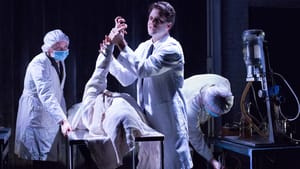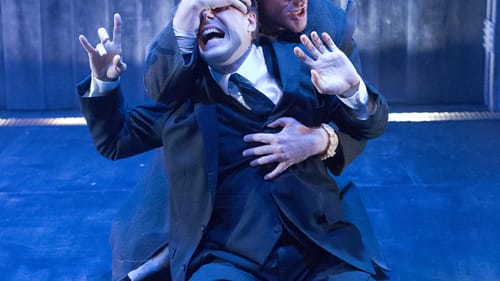Stay in the Loop
BSR publishes on a weekly schedule, with an email newsletter every Wednesday and Thursday morning. There’s no paywall, and subscribing is always free.
Monstrous excess
Quintessence Theatre Group presents Alexander Burns's adaptation of Mary Shelley's 'Frankenstein'

Few fictional creations are so ubiquitous and so misrepresented as Doctor Victor Frankenstein and his monster, introduced in the novel Frankenstein; or, The Modern Prometheus by Mary Shelley (1797-1851) when she was just 21. Two hundred years later, Quintessence Theatre Group launches its ninth season with artistic director Alexander Burns's stage adaptation.
Burns's Frankenstein avoids the horror clichés that have warped the story, particularly in its many film incarnations (though Igor makes a brief silly appearance). However, his dedication to Shelley's text raises doubts that his version serves the audience as well as it showcases the author.
"Listen patiently to the end of my story"
While staging a novel's entire text isn't unheard of — consider Elevator Repair Service's word-for-word interpretation of F. Scott Fitzgerald's The Great Gatsby (among other novels), Burns's choices compromise rather than illuminate Frankenstein. At over three hours, they also test our endurance.
Victor Frankenstein's story occurs as a long flashback. The novel and Burns's play begin at the end, with Frankenstein rescued in the Arctic by an English explorer who transcribes his story. Though near death, Frankenstein musters the strength to narrate his tale with voluminous detail that works better on the page than the stage.
Part of the problem is Shelley's lush language; when earnestly and breathlessly recited on opening night, it provoked laughs. Michael Zlabinger’s Frankenstein works frantically to share the overwhelming exposition, starting with his childhood and family history. Zlabinger and the ensemble often pantomime what he narrates.
Since we know where the story is going, however much it's been altered and spoofed over two centuries, the effort feels tedious and key moments get shortchanged. When Frankenstein begins building his creation, we're 45 minutes into the play and the process rushes by. When Frankenstein "bestows animation on lifeless matter," the achievement likewise feels glossed over.
When every detail receives equal importance, the essential ones don't stand out.
Soon after the Monster's creation, Frankenstein rejects him — another unexplored event. Flashbacks interrupt flashbacks. The Monster (Jake Blouch, in a lumpy bodysuit and latex facial features, eyes made piercing blue) also narrates; when he spies on a poor family, we hear their entire history.

Too much movement, not enough action
Burns's busy stagecraft can't overcome the words' sheer weight. Brian Sidney Bembridge's grayish set highlights primitive times and places, Frankenstein's shadowy endeavors, and the icy wasteland where the doctor was found. Lab tables roll on and off, a bathtub also serves as several boats, and a bed becomes central (as a place to stand) late in the story. Bembridge's lighting adds some scares, as do Daniel Ison's sound effects and Curtis Coyote's bloody effects.
Given the reliance on Shelley's text, Jane Casanave's modern costumes are incongruous but great for quick changes. Kevin Bergen, Lee Cortopassi, Leah Gabriel, and Hannah Wolff play many roles with impressive clarity, with Coralie Lyford as the tale's several children.
The play's third hour builds to an immediate and intense struggle between Frankenstein and the monster. "Though hast made me more powerful than thou art," the monster crows. Frankenstein ponders the "duties of a creator to his creation." We're finally immersed not only in the story's climactic battle but the essence of Shelley's powerful themes.
But will an audience today appreciate Shelley's profound achievement and lasting influence through this verbose, static version? A Frankenstein adaptation crafted for 2018 audiences might retain the impact and importance of Mary Shelley's 1818 novel in a more theatrically satisfying form.
Instead, Burns's frantic staging illustrates Ernest Hemingway's observation, "Movement is not the same as action." Even more apropos for the doctor, Mark Twain's once asserted that choosing the right word "is the difference between lightning and the lightning bug."
What, When, Where
Frankenstein. By Mary Shelley, adapted and directed by Alexander Burns. Quintessence Theatre Group. Through October 21, 2018, at the Sedgwick Theater, 7137 Germantown Avenue, Philadelphia. (215) 987-4450 or quintessencetheatre.org.
Sign up for our newsletter
All of the week's new articles, all in one place. Sign up for the free weekly BSR newsletters, and don't miss a conversation.

 Mark Cofta
Mark Cofta